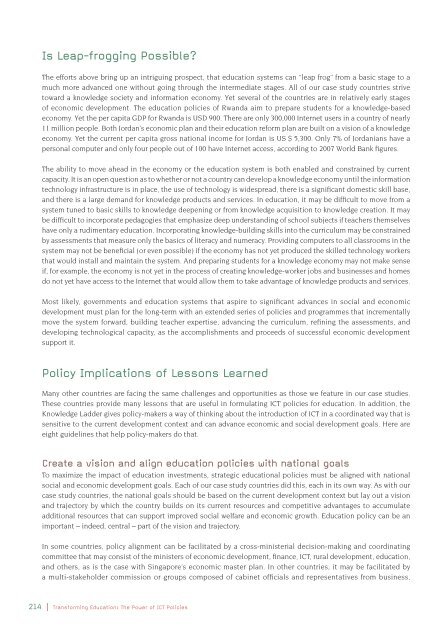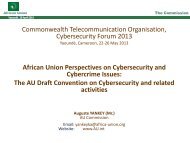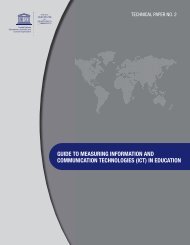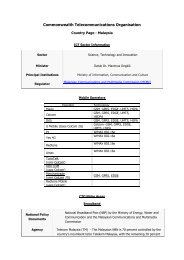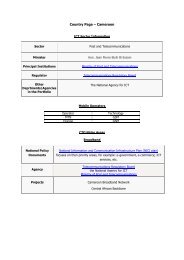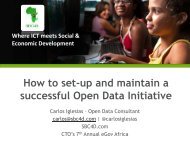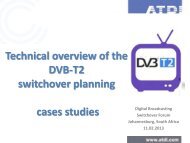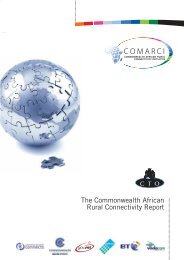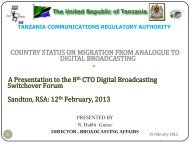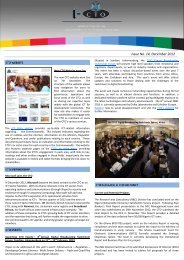Transforming education: the power of ICT policies - Commonwealth ...
Transforming education: the power of ICT policies - Commonwealth ...
Transforming education: the power of ICT policies - Commonwealth ...
You also want an ePaper? Increase the reach of your titles
YUMPU automatically turns print PDFs into web optimized ePapers that Google loves.
Is Leap-frogging Possible?<br />
The efforts above bring up an intriguing prospect, that <strong>education</strong> systems can “leap frog” from a basic stage to a<br />
much more advanced one without going through <strong>the</strong> intermediate stages. All <strong>of</strong> our case study countries strive<br />
toward a knowledge society and information economy. Yet several <strong>of</strong> <strong>the</strong> countries are in relatively early stages<br />
<strong>of</strong> economic development. The <strong>education</strong> <strong>policies</strong> <strong>of</strong> Rwanda aim to prepare students for a knowledge-based<br />
economy. Yet <strong>the</strong> per capita GDP for Rwanda is USD 900. There are only 300,000 Internet users in a country <strong>of</strong> nearly<br />
11 million people. Both Jordan’s economic plan and <strong>the</strong>ir <strong>education</strong> reform plan are built on a vision <strong>of</strong> a knowledge<br />
economy. Yet <strong>the</strong> current per capita gross national income for Jordan is US $ 5,300. Only 7% <strong>of</strong> Jordanians have a<br />
personal computer and only four people out <strong>of</strong> 100 have Internet access, according to 2007 World Bank fi gures.<br />
The ability to move ahead in <strong>the</strong> economy or <strong>the</strong> <strong>education</strong> system is both enabled and constrained by current<br />
capacity. It is an open question as to whe<strong>the</strong>r or not a country can develop a knowledge economy until <strong>the</strong> information<br />
technology infrastructure is in place, <strong>the</strong> use <strong>of</strong> technology is widespread, <strong>the</strong>re is a signifi cant domestic skill base,<br />
and <strong>the</strong>re is a large demand for knowledge products and services. In <strong>education</strong>, it may be diffi cult to move from a<br />
system tuned to basic skills to knowledge deepening or from knowledge acquisition to knowledge creation. It may<br />
be diffi cult to incorporate pedagogies that emphasize deep understanding <strong>of</strong> school subjects if teachers <strong>the</strong>mselves<br />
have only a rudimentary <strong>education</strong>. Incorporating knowledge-building skills into <strong>the</strong> curriculum may be constrained<br />
by assessments that measure only <strong>the</strong> basics <strong>of</strong> literacy and numeracy. Providing computers to all classrooms in <strong>the</strong><br />
system may not be benefi cial (or even possible) if <strong>the</strong> economy has not yet produced <strong>the</strong> skilled technology workers<br />
that would install and maintain <strong>the</strong> system. And preparing students for a knowledge economy may not make sense<br />
if, for example, <strong>the</strong> economy is not yet in <strong>the</strong> process <strong>of</strong> creating knowledge-worker jobs and businesses and homes<br />
do not yet have access to <strong>the</strong> Internet that would allow <strong>the</strong>m to take advantage <strong>of</strong> knowledge products and services.<br />
Most likely, governments and <strong>education</strong> systems that aspire to signifi cant advances in social and economic<br />
development must plan for <strong>the</strong> long-term with an extended series <strong>of</strong> <strong>policies</strong> and programmes that incrementally<br />
move <strong>the</strong> system forward, building teacher expertise, advancing <strong>the</strong> curriculum, refi ning <strong>the</strong> assessments, and<br />
developing technological capacity, as <strong>the</strong> accomplishments and proceeds <strong>of</strong> successful economic development<br />
support it.<br />
Policy Implications <strong>of</strong> Lessons Learned<br />
Many o<strong>the</strong>r countries are facing <strong>the</strong> same challenges and opportunities as those we feature in our case studies.<br />
These countries provide many lessons that are useful in formulating <strong>ICT</strong> <strong>policies</strong> for <strong>education</strong>. In addition, <strong>the</strong><br />
Knowledge Ladder gives policy-makers a way <strong>of</strong> thinking about <strong>the</strong> introduction <strong>of</strong> <strong>ICT</strong> in a coordinated way that is<br />
sensitive to <strong>the</strong> current development context and can advance economic and social development goals. Here are<br />
eight guidelines that help policy-makers do that.<br />
Create a vision and align <strong>education</strong> <strong>policies</strong> with national goals<br />
To maximize <strong>the</strong> impact <strong>of</strong> <strong>education</strong> investments, strategic <strong>education</strong>al <strong>policies</strong> must be aligned with national<br />
social and economic development goals. Each <strong>of</strong> our case study countries did this, each in its own way. As with our<br />
case study countries, <strong>the</strong> national goals should be based on <strong>the</strong> current development context but lay out a vision<br />
and trajectory by which <strong>the</strong> country builds on its current resources and competitive advantages to accumulate<br />
additional resources that can support improved social welfare and economic growth. Education policy can be an<br />
important – indeed, central – part <strong>of</strong> <strong>the</strong> vision and trajectory.<br />
In some countries, policy alignment can be facilitated by a cross-ministerial decision-making and coordinating<br />
committee that may consist <strong>of</strong> <strong>the</strong> ministers <strong>of</strong> economic development, fi nance, <strong>ICT</strong>, rural development, <strong>education</strong>,<br />
and o<strong>the</strong>rs, as is <strong>the</strong> case with Singapore’s economic master plan. In o<strong>the</strong>r countries, it may be facilitated by<br />
a multi-stakeholder commission or groups composed <strong>of</strong> cabinet <strong>of</strong>fi cials and representatives from business,<br />
214 | <strong>Transforming</strong> Education: The Power <strong>of</strong> <strong>ICT</strong> Policies


